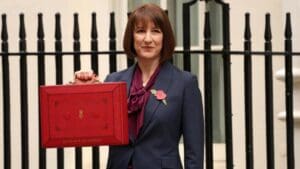
Budget 2024: Record £40bn tax hike set to slow UK economic growth, warns OBR

Chancellor Rachel Reeves has introduced a record-breaking £40bn tax rise in her first Budget, which the Office for Budget Responsibility (OBR) warns could stifle long-term economic growth.
According to the OBR, Britain’s economy will expand by just over 1% this year, peaking at 2% in 2025, but remaining below its potential growth rate of 1.66% thereafter.
The biggest change comes from a 1.2 percentage point hike in National Insurance contributions (NICs) for employers, bringing the rate to 15% from April and expected to raise £25bn. This move has been met with concern from business leaders and analysts who fear it will add to the financial strain on companies.
“This is a tough Budget for business,” said Rain Newton-Smith, CBI Chief Executive. “While the Corporation Tax Roadmap offers stability, the NICs increase and other cost hikes will hurt businesses, making it more costly to hire or raise wages.” Newton-Smith emphasised that private sector investment is essential to achieving the UK’s growth targets and urged the government to work closely with businesses to unlock potential investments, particularly in infrastructure and green energy.
The Budget also includes an increase in Capital Gains Tax (CGT), with the lower rate rising from 10% to 18% and the higher rate from 20% to 24%, while rates on residential property remain the same. Muj Choudhury, CEO of RocketPhone, expressed concern over the CGT changes, particularly their impact on Britain’s tech and AI sectors, which depend on high-risk capital for early-stage growth. “This reform sends the wrong message as we try to establish the UK as a global AI hub. Increasing CGT creates barriers for tech entrepreneurs, who are already hesitant given rising taxes and costs,” he said.
For small businesses, the rise in NICs is likely to present significant challenges. Todd Davison, MD of Purbeck Personal Guarantee Insurance, warned that the tax hike could be “a fatal blow” for small enterprises still recovering from the pandemic. “This increase will make it more costly to run a business and could limit hiring, raise prices, or even force some owners to close down,” he added, noting that businesses in labour-intensive sectors like hospitality, retail, and leisure may struggle most.
Meanwhile, the Budget includes positive news for small businesses, with the Employment Allowance increase easing the NIC burden for companies with smaller payrolls. Michelle Ovens CBE, founder of Small Business Britain, noted that while small businesses may feel the impact of the NIC and minimum wage hikes, many will benefit from business rates relief and reduced tax pressure on high street companies. “There’s reason for optimism,” she said. “The government is clearly recognising the contribution of small, local businesses.”
The freeze on inheritance tax thresholds has also been extended until 2030, drawing mixed reactions. Ms Reeves defended the tax hikes, claiming they were necessary to address “black holes” in public finances and to fund long-overdue compensation for victims of the Post Office Horizon and infected blood scandals.
While Reeves’s Budget aims to shore up public finances and fund critical sectors like healthcare—with an extra £22.6bn for the NHS—many business leaders worry the measures could hamper the UK’s growth ambitions. Stephen Phipson, Chief Executive of Make UK, acknowledged that while the Budget presents challenges, especially for SMEs, the inclusion of an Industrial Strategy and continued support for programmes like Made Smarter offers a clear path for growth in manufacturing.
As businesses across the UK absorb the effects of the Budget, the long-term impact on investment, hiring, and overall economic stability remains uncertain. The £40bn tax increase underscores the government’s commitment to balancing the books, but critics argue it risks undermining Britain’s competitive edge and discouraging the private sector investment needed to drive sustained growth.
Read more:
Budget 2024: Record £40bn tax hike set to slow UK economic growth, warns OBR
